Key takeaways:
- Project budgeting is a strategic decision-making process that requires flexibility and constant adjustment to account for unforeseen expenses.
- Effective budgeting in programming fosters prioritization, prevents overspending, and encourages innovation under financial constraints.
- Utilizing tools like budgeting software and spreadsheets enhances clarity and control over financial management in projects.
- Regular monitoring of the budget and team collaboration are essential practices for accurate forecasting and resource allocation.
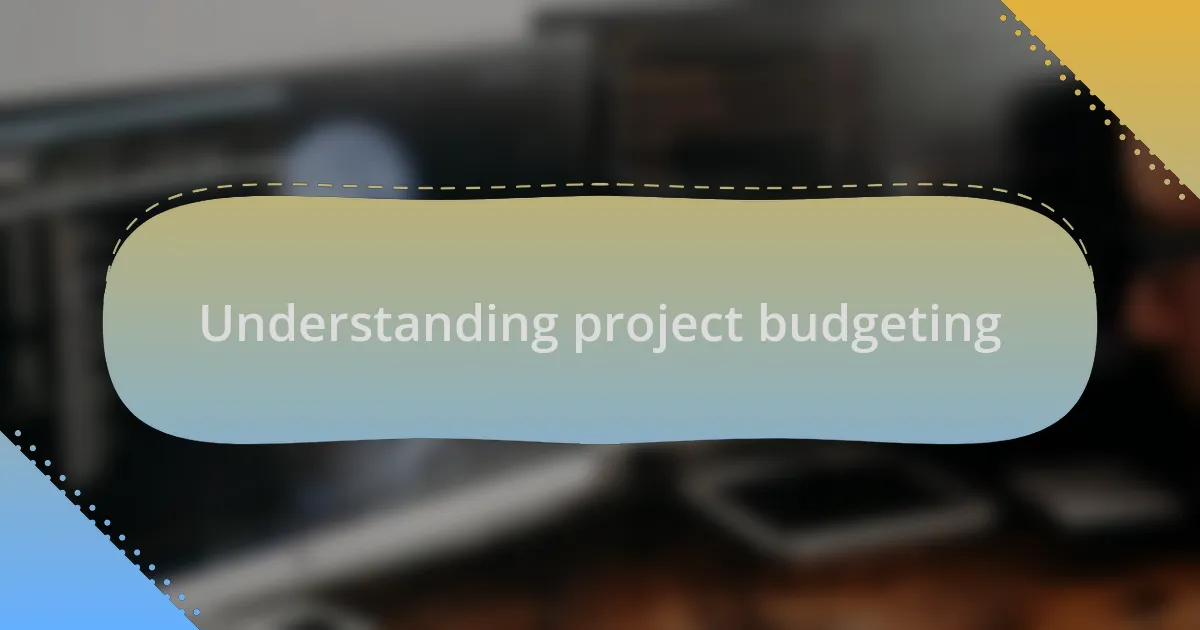
Understanding project budgeting
When I first encountered project budgeting, it felt like staring into a maze without a map. I remember how overwhelming it was to allocate resources for different tasks, and I often wondered how to predict expenses accurately. The realization that budgeting isn’t just a technical exercise, but rather a strategic decision-making process, shifted my perspective entirely.
Every time I draft a budget, I think of it as a living document that requires constant reflection and adjustment. For instance, during a recent project, I had to pivot my initial budget after unforeseen expenses emerged, such as hiring additional support for tight deadlines. This experience taught me the importance of building in flexibility; it’s crucial for navigating the unforeseen twists that inevitably arise in any project.
Understanding project budgeting means recognizing the balance between cost, time, and quality — the proverbial iron triangle of project management. Have you experienced moments when you felt that quality was compromised by budget constraints? I’ve been there, and it’s a tough lesson to learn. It’s essential to communicate not just the numbers, but the value behind them to your team and stakeholders, aligning everyone toward a common goal while ensuring that the budget reflects the project’s true needs.
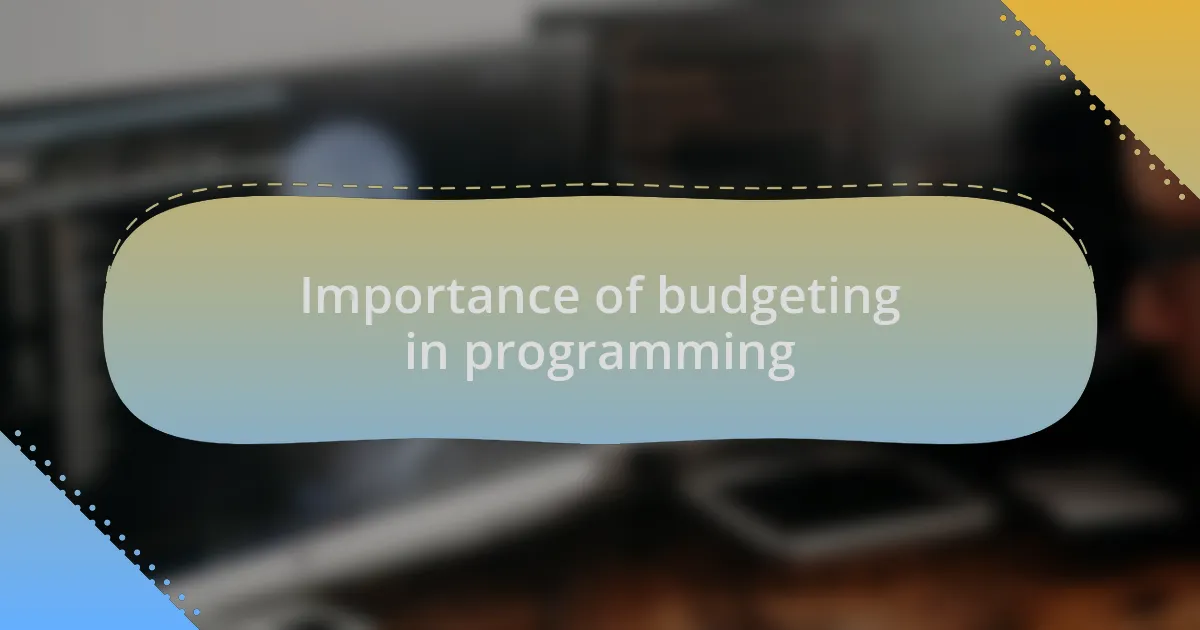
Importance of budgeting in programming
Budgeting in programming is crucial for several reasons. From my experience, allocating funds effectively allows teams to prioritize tasks based on their importance and impact. Have you ever had a project derailed because resources were mismanaged? I certainly have, and it’s a sobering realization that budgeting mistakes can ripple throughout the project timeline.
One significant aspect I’ve learned is that a well-planned budget not only helps prevent overspending but also fosters creativity within constraints. For instance, when I was part of a tight project, I realized that limited funds forced our team to innovate solutions rather than resorting to the more expensive options. It was a challenging but ultimately rewarding process that enhanced collaboration and resulted in a product we were proud of.
Moreover, budgeting serves as a communication tool among team members and stakeholders. I often find that when I share budget details, it sparks discussions about the project’s goals and challenges, fostering a collective sense of ownership. This engagement reminds us that financial stewardship isn’t just about preventing losses; it’s about driving success together. How do you approach these conversations in your projects? I like to think of every budget discussion as an opportunity to bring the team closer to our common objectives.
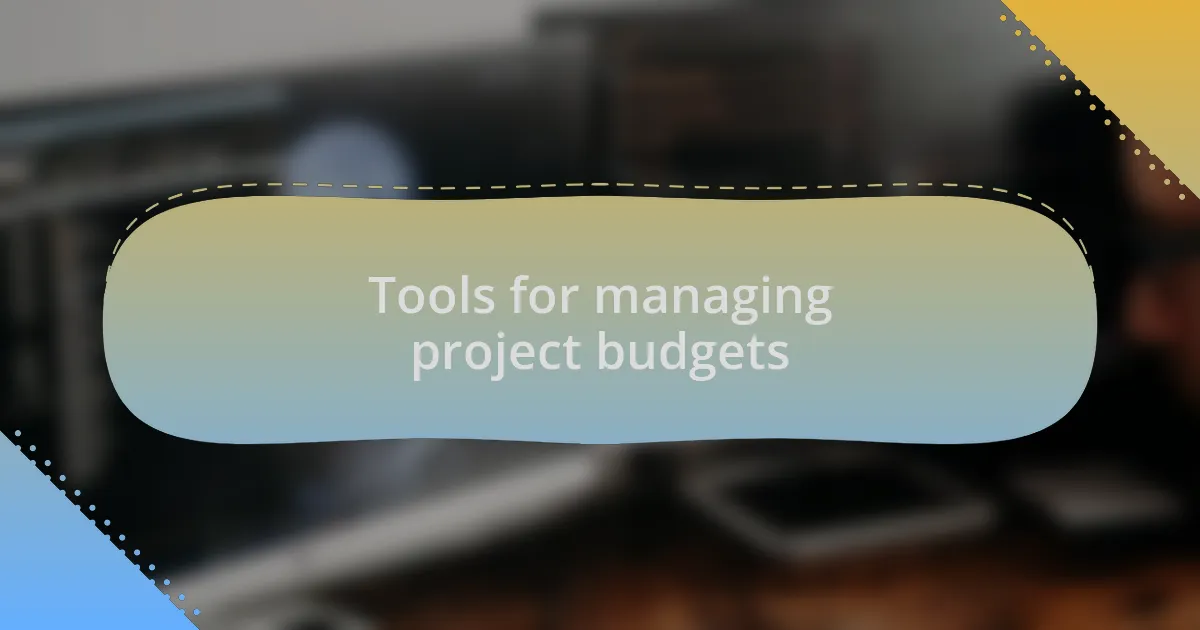
Tools for managing project budgets
When it comes to managing project budgets, I’ve found that using software tools can make a significant difference. In my experience, platforms like Trello and Asana not only help track tasks but can also integrate budget features that allow for real-time financial updates. Have you ever had a moment when you realized you were over your budget? It can be overwhelming, but these tools provide visual cues to keep everything on track.
Another tool I swear by is Microsoft Excel. I often create detailed budget spreadsheets that break down costs by categories, which helps me see exactly where our resources are allocated. The power of customization in Excel means I can tailor my budget according to specific project needs and scenarios—something I didn’t fully appreciate until I had a project spiral out of control financially. It’s amazing how a simple spreadsheet can provide clarity and control when every dollar counts.
Lastly, I’ve dabbled with budget management apps like YNAB (You Need a Budget) that offer a more personal approach to financial planning. I remember feeling more confident in my decisions when I had a visual representation of my spending and savings goals. These apps make budgeting feel less like a chore and more like an empowering tool in steering my projects toward success. Have you used any personal finance tools for your work projects? It’s worth exploring how they can shift your perspective on budgeting.
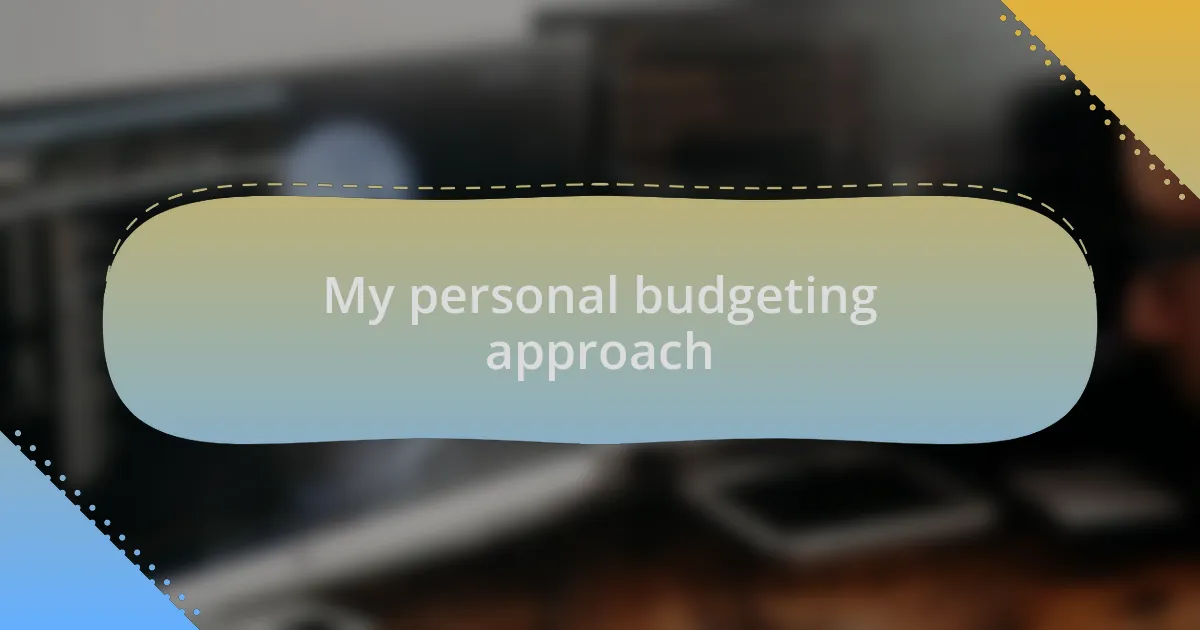
My personal budgeting approach
When it comes to my personal budgeting approach, I start by setting up clear financial goals for each project. I vividly remember a time when I overlooked this step, leading to unexpected expenses that left me scrambling. By defining what I want to achieve financially upfront, I can better allocate resources and maintain control throughout the project’s lifecycle.
Another aspect of my approach is regular monitoring of the budget. I’ve learned that checking in weekly, rather than waiting until the end of the month, helps me catch discrepancies early on. There was one project where a minor expense ended up bloating the budget; if I had tracked it more frequently, I could have addressed it before it became a major issue.
Moreover, I embrace flexibility in my budgeting. Sometimes unexpected costs arise, and I’ve had to adjust my budget accordingly. Instead of viewing these changes as setbacks, I see them as opportunities to learn and adapt—like the time I had to reallocate funds to address unanticipated software expenses. How do you handle the unexpected in your budgeting? I’ve found that the key lies in being prepared to pivot without losing sight of the overall goal.
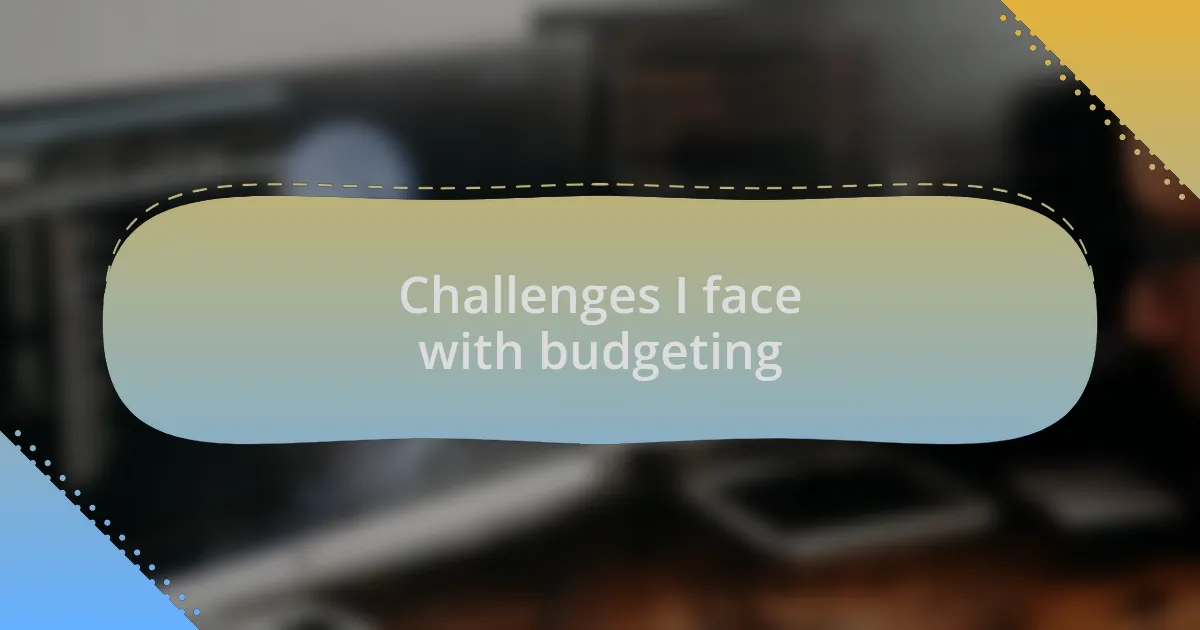
Challenges I face with budgeting
Facing challenges with budgeting has become a common aspect of my project management. I often struggle with accurately estimating costs at the outset. There was a project where I initially thought I’d need a modest sum, only to discover later that essential tools were much more expensive than I had anticipated. That realization was a punch to the gut, prompting me to rethink my entire approach to forecasting costs.
Another challenge I frequently encounter involves the allocation of resources. I’ve had instances where I poured too much into one area, only to find myself short in another. This happened on a recent project where I over-invested in marketing, neglecting critical development tools. It was a stressful situation that raised the question: How do I strike the right balance? I’ve learned that prioritizing expenditures and being mindful of all aspects of the project can help avoid such pitfalls.
Lastly, unexpected changes can really throw a wrench in my budgeting plans. For instance, when a key team member left midway through a project, I suddenly faced additional hiring costs, compounding my budget anxiety. This taught me the importance of setting aside contingency funds for unforeseen scenarios. Asking myself, how can I prepare for the unexpected? I’ve found that maintaining a small buffer in my budget makes a world of difference when chaos inevitably arises.
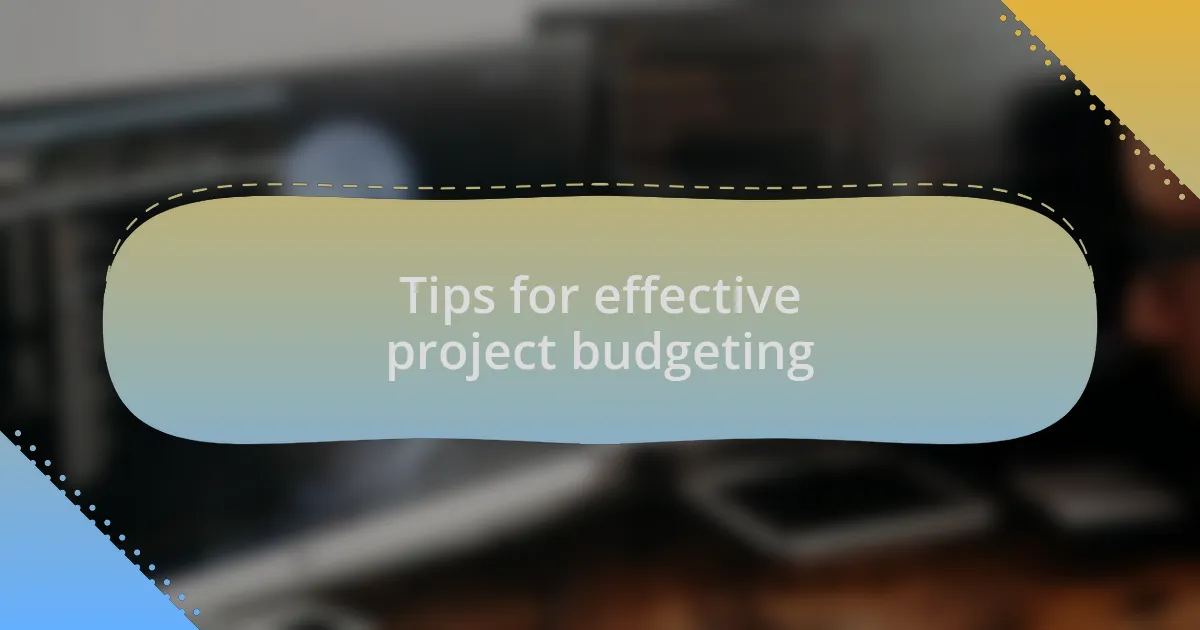
Tips for effective project budgeting
One effective strategy for managing project budgets is to break down the overall cost into smaller, manageable components. When I worked on a software development project, I created a detailed line-item budget that included everything from software licenses to team lunches. This not only made tracking expenses easier but also helped me spot potential overruns before they became serious issues. Have you ever found yourself amazed at how small expenses can add up? They certainly can, which is why a granular approach can be crucial.
Regularly reviewing your budget is another vital practice. During one project, I scheduled bi-weekly budget checks, which allowed me to catch discrepancies early. Unexpected expenses popped up, but because I was monitoring my budget closely, I was able to adjust allocations dynamically. I often ask myself: “How can I ensure I’m on the right track?” These regular audits offer clarity and keep the entire team informed.
Lastly, collaborating with your team helps ground your budget in reality. On a recent project, including team members in the budgeting process revealed insights I would have otherwise overlooked. They shared their expectations for tools and resources, which refined my estimates significantly. Isn’t it fascinating how the expertise of your team can enhance your budgeting accuracy? Team input not only fosters ownership but also eases the pressure on you as the project manager.